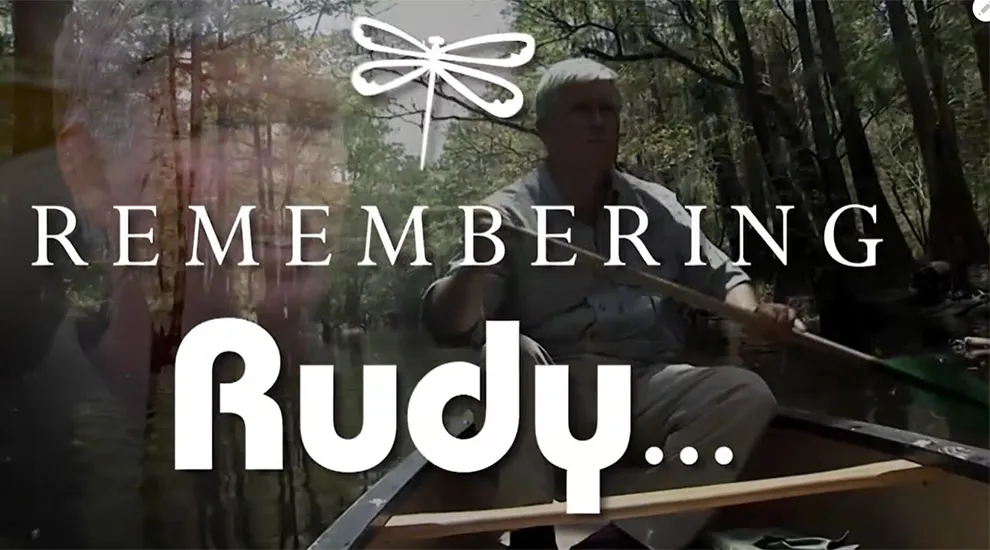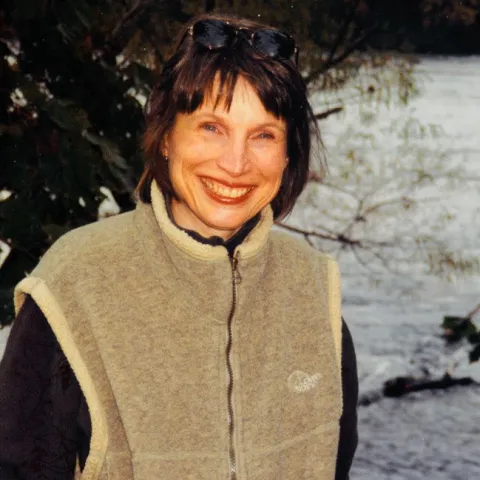
In this segment, Remembering Rudy, the ETV vault shares footage of Rudy on location as well as a montage of photos showing Rudy over the years. Beryl Dakers and a group of ETV colleagues, past and present, gather to talk about naturalist Rudy Mancke and what it has meant to have him with us over the years. The gathering gave us a chance to come to grips with the grief that settled over ETV and Public Radio over the sudden loss of our colleague. Everyone was shaken by his death even though he has always told us, death is a part of life, ironically, reminding us in an episode of NatureNotes just a few days before his passing.
Beryl Dakers noted that NatureScene probably was the catalyst for all the things that eventually were spawned at South Carolina ETV, and it was the culmination of a dream; a dream that Rudy and I dreamt and shared before either of us came to work at ETV. We vowed that one day, if it were at all possible, we would take a camera out in a field and share firsthand with our viewers what it was like to experience nature. When I got to ETV, we were in a position to create new shows. NatureScene became one of our monthly Friday evening 7:30 specials, and that is how that first show began.
ETV CEO Adrienne Fairwell observed that Rudy left a profound impact on not just this network, but also the state of South Carolina. He taught us how to see the smallest of things, see their value and connection. Her first contact with Rudy was watching him on television, and later she became an ETV Endowment intern assigned to Rudy and the NatureScene program. Previously a nonstarter as a hiking girl, the interaction with Rudy and the crew on the shoot at the Congaree Swamp was so much fun that it turned her into a “swamp girl.”
Whether on television, radio, or leading a walk for the ETV endowment, Rudy was a consummate educator. Bette Jamison noted that she had worked with Rudy for over 30 years, and not only did they produce programming for students in grades K-12 in South Carolina, but they created teacher recertification courses that teachers used to renew their teaching certificates. The teachers learned not just about the content and about nature from him, but they also learned to teach. Bette said that he showed us that when you are passionate about whatever you teach, whatever the subject, you become a better teacher when you teach from the heart.
Rudy was a scientist and student. He never went on any shoots without books, and Beth Rickenbacker and Allen Sharpe talked about the weight of those items in their baggage especially after NatureScene went national. He never went into any situation blind, and he knew what type of flora and fauna could be expected in every location. This probably informed his legendary eagle eye. He would suddenly spy something that needed to be recognized and his crew would be greeted with “stop the car” and he would jump out of the vehicle, with wonder and delight to capture, display and identify his finds.
Rudy and his colleagues were aware of the archival legacy provided by the NatureScene programs. Not only would these continue to reach and teach an audience, but they would be a resource that could provide information of ecological importance to his beloved state in the future.
Elaine Freeman of the ETV Endowment cherished the long relationship with Rudy and his willingness to be a resource for the Endowment. She said that he was our fundraising partner because he realized that you can’t look at the rose granite on Cadillac Mountain in Maine and equate it to the rose granite in the mountains of North Carolina or sneak up on a moose in the Tetons with your crew unless you had resources.
Over and over Rudy reminded us to slow down, pay attention, to think about what we have seen, how it fits in and to learn its connection. In the Side Notes below, you can learn more about Rudy, NatureScene and NatureNotes and the veritable joy of the crew on a shoot, when you might have to pinch yourself to see that you were really there.
Side Notes:
I was honored and blessed to be a part of NatureScene and to walk with Rudy in all 50 states and around the world. He was a joy and taught me to love and appreciate the natural world around us. He left this world in a better place through his constant sharing of the wonderful mystery of nature. He’s with me in my heart and mind as I walk the trails in the Blue Ridge Mountains that I now call home. – Jim Welch
Rudy loved the state park system. I think that in our own way we helped encourage people to go out and visit state parks, and locations you could see. He said several times, “You don’t have to go to Africa on safari to see some neat stuff. Just slow down and look.” When on a walk with Rudy, people show up and they have backpacks, water bottles, hiking sticks. Well, they may be lucky to get out of the parking lot. – Allen Sharpe
He was always studying. Everywhere we went he was prepared. We didn’t go in there blind. We went in there prepared, and we knew what we could expect, and there were always surprises, but he studied it, and there was probably not anywhere we ever went where he did not pick up a book. While we were there, he had a book with him. When we got there, he talked to the local guides. So, he was always studying. Books were everywhere. – Beth Rickenbacker
What a privilege it is to talk about Rudy Mancke! He was a rare individual and any interaction with him was a learning experience. He always said knowledge is power. Not political power, but the power to understand the natural world and its connectedness. And that’s what he did with the ETV Endowment for 30 years or more. He was our fundraising partner because he realized that you can’t look at the rose granite on Cadillac Mountain in Maine and equate it to the rose granite in the mountains of North Carolina or sneak up on a moose in the Tetons with your crew unless you had resources. So helped us with the resources. He was in the studio during pledge nights bringing his treasures, artifacts, skulls, shells, and connecting the natural world to philanthropy. Rudy was a gift to the world, and we are all connected because he connected us to that world. He was a gift that we will treasure all our lives. - Elaine Freeman, ETV Endowment
He was such a Pied Piper and taught us so much in every show. You know, walking down a sidewalk he taught you things you didn’t know you didn’t know. – Martha Fowler
On the challenges of international travel and Chernobyl: Definitely, definitely had its challenges particularly in the Ukraine, we did one in Chernobyl and then we did another one in Kiev. But the travel, the logistics, we had to take translators and actually going to Chernobyl we stayed in the Old Village of Chernobyl and we knew the story was nature reclaiming an urban area, and that is the story we were telling. But we had to wear the clothing they gave us and wore little pins to measure radiation. I think we all came back normal except for Allen and Jim and they were not going to be allowed to return for 5 years. – Beth Rickenbacker
We did NatureNotes for over 24 years and we did 6,200 episodes. I didn’t know Rudy until the summer of 1999 when we met to kind of go over what we’re going to do with NatureNotes. The first day he came in for taping he had a little 5 by 7 card, which had 15 words on it and it dawned on me, I said that’s his script. Sure enough, you take that one word and he would go for a full minute and he would nail it 59.9 seconds every single time and boy, I walked out of there impressed. We did the first 15 NatureNotes in like 25 minutes. – John Gasque
In 2009 I made the documentary, A Look Back at NatureScene, and we also made a show called NatureScene Butterflies where we went back and looked at all of the footage that Allen had shot and picked the ones for the show. Thereafter Rudy wanted to go out into a field for his introductions to the footage and he knew the perfect place to go...a field like that first field you did back in 1978, and we got this wonderful footage, and when we got back in the van and we started leaving and he said “stop the van, pull over!” We pulled over, we jumped out, picked up a turtle and showed it to us, and he was like a kid with the wonder of the discovery. I took a photo of him at that moment and to me that was Rudy. The image of Rudy I’ll always forever remember. – Mark Adams
And it shows you how sharp Rudy’s eyes were because he could be speeding down the road and he would say “stop the car!” He did this once when he was at the museum. He could see things that we couldn’t because he knew what to look for and he knew what was there in any kind of environment. He knew what kind of animals and critters and plants were there and he would go straight to it, and he would find something wherever he was. – Tut Underwood
We were on Bull’s Island before Hugo came; we went back afterwards, went to the same spot. Allen dissolved from the way it was to the aftermath. I think that’s some of the most powerful television I’ve ever seen. And if you want to know what a hurricane can do to a barrier island, that is the way to do it. And then we went back 5 years later and put all 3 together before, just after, and 5 years later. That archive of video of those programs I think are incredible. – Rudy Mancke
My life would not have been as rich as it has been if it had not been for this network for NatureScene specifically and for all the folks who had a hand in making it possible. I have lived a richer life than I would have ever lived otherwise because of this program and because of this network and because of this state supporting it. You know, I think about this often I’ll never be able to repay a lot of people who made a difference in my life. Parents and all of course but professors, you know, at Wofford and at the University of South Carolina, friends here at the network. People who watch the show and say things. How can you ever repay them for those kindnesses, but I’ve had a lot of joy that’s come my way and as I said, I feel richer than anybody that I know and it has nothing to do with money. It has to do with those wonderful experiences that I had a chance to have myself and share with people. Wouldn’t trade places with anybody in the world. – Rudy Mancke
NatureScene Originals (1978-1982) are now available here.

